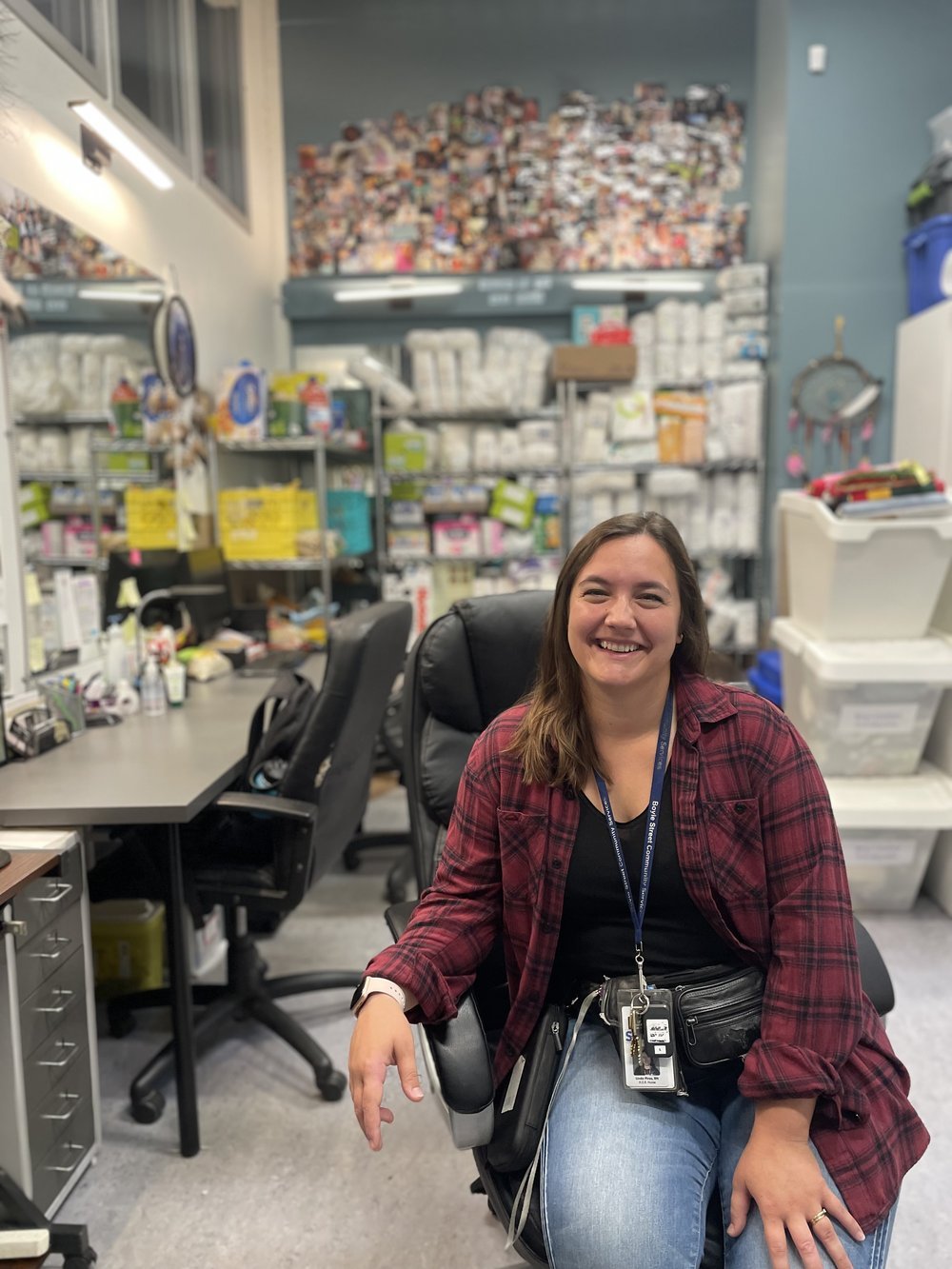Linda Pires-Relvas: Harm Reduction, Pregnancy, and Support for Marginalized Communities
Linda Pires-Relvas: Harm reduction, pregnancy, and support for marginalized communities
Linda Pires-Relvas is making a difference in the lives of pregnant marginalized women in Edmonton, AB.
Linda always knew she wanted to work in nursing but wasn’t sure what area of nursing she was most passionate about.
During her first year of studies at MacEwan University, a nurse from the Boyle Street Community Services Streetworks Team did a presentation about harm reduction and nursing ethics, and she was immediately inspired.
Pires-Relvas began her preceptorship at Streetworks in Feb. 2018, graduated in April, and then started working two days later in the supervised consumption site. In July 2018, she started working as a registered nurse within the H.E.R Pregnancy Program and has been there ever since.
“We are dealing with people in their most vulnerable moments of life, but we also get to see people make complete 180s and change their life around. It’s really fulfilling work,” she said.
H.E.R. Pregnancy Program
The H.E.R.(Healthy, Empowered, Resilient) Pregnancy Program operates out of Streetworks, located at the Boyle Street Community Services in Edmonton.
Pires-Relvas explained that they work with pregnant women who come from low-income, houseless, and marginalized communities and give them access to health education, testing, treatment, and social resources at any stage during their pregnancy.
As part of the program, women are encouraged to be tested for sexually transmitted and bloodborne infections (STBBIs). With syphilis on the rise in Alberta, programs like the H.E.R. Pregnancy Program are crucial for both the health of the mother and fetus.
“A healthy woman will have a healthy baby,” said Pires-Relvas. “A lot of other programs focus on the fetus but forget that there is a woman first.”
She emphasized that it’s been widely believed that using substances in pregnancy has negative effects on the developing fetus (i.e. the crack baby myth in the 1960s), which is true to an extent, however, does not account for other factors at play—including houselessness, stress, nutrition.
“In our experience, we see that when clients gain stability (get housed, leave abusive partnerships, access mental health supports, etc.), they also use less substances as they're no longer in fight or flight mode, trying to survive. And that's a big part of the work we do.
This program works with women until 6 months post-partum (after delivery) and helps them find housing, get income support, and advocates for them with social services. After 6 months they are referred to other programs to meet their needs.
To help make the program more accessible and approachable to women in need, the H.E.R. program includes staff with lived experiences. Pires-Relvas explained that when she started 4 years ago, Vanessa—one of her colleagues—was actually a client.
Helping clients reconnect with their Indigenous roots
“Vanessa got treatment and reconnected with Elders and her Indigenous identity, and she’s come full circle. Now she works here with us. It’s possible to break the cycle with the right supports in place,” Pires-Relvas said.
She also explained that a significant part of the H.E.R program is incorporating Indigenous culture into the work they do. According to Pires-Relvas, most of their Indigenous clients have lost, or never had, connection to their roots, language, or culture—primarily because of intergenerational trauma.
“Since all of our support workers are Indigenous, they are able to share teachings that have been shared with them, provide the traditional medicines such as sage and sweetgrass for smudging, and take clients to ceremonies such as sweats, medicine picking, and sharing circles—which can be really therapeutic and healing for our clients,” she said.
Pires-Relvas also expressed that all staff, including nurses, at Boyle Street have the opportunity to engage in Indigenous ceremonies and learn about Indigenous teachings.
“This opportunity is rare for programs like ours, since they're usually primarily focused on Western medicine and ways of knowing. Getting to learn about the culture that is a big part of who are clients are and incorporate it into our practice is a driving force for healing and reconciliation,” she said.
Understanding harm reduction and addiction
Pires-Relvas explained that harm reduction is a humane response to addressing mental health and addiction. It gives people options, a voice, informed consent, and evidence-based knowledge without judgement or coercion.
Working on the Streetworks team and in supervised consumption sites, she’s observed first-hand that all clients have different needs. The most important part of harm reduction is figuring out how to work with clients so they can live their lives in safer and healthier ways.
“We work with clients to come to a place where we’re supporting them,” she said.
“They need education and support to be able to make a change and realize what’s possible for them to do—based on the social determinants of health we talk about in our nursing education.”
She emphasized that they always tell their clients that relapse is ok, it doesn’t mean they’ve failed.
A passion to make change
Pires-Relvas explained that at Boyle Street Community Services, they truly get to know their clients.
“We get to see them as a person - support them to make changes and address other areas where they need assistance,” she said.
“We are part of the community. We have barbeques, lunches, dances, and karaoke, and it really helps break down the walls between the workers and clients.”
Pires-Relvas explained that she learns a lot from her clients, too. It’s so important to see that they are more than their addiction or diagnosis.
“No matter where your career takes you, or who your family or friends are, you’ll see addiction and mental health issues. These challenges cross all sectors of society” she concluded.
“We need to focus on how we can support people – because addictions and mental health issues are everywhere.”

